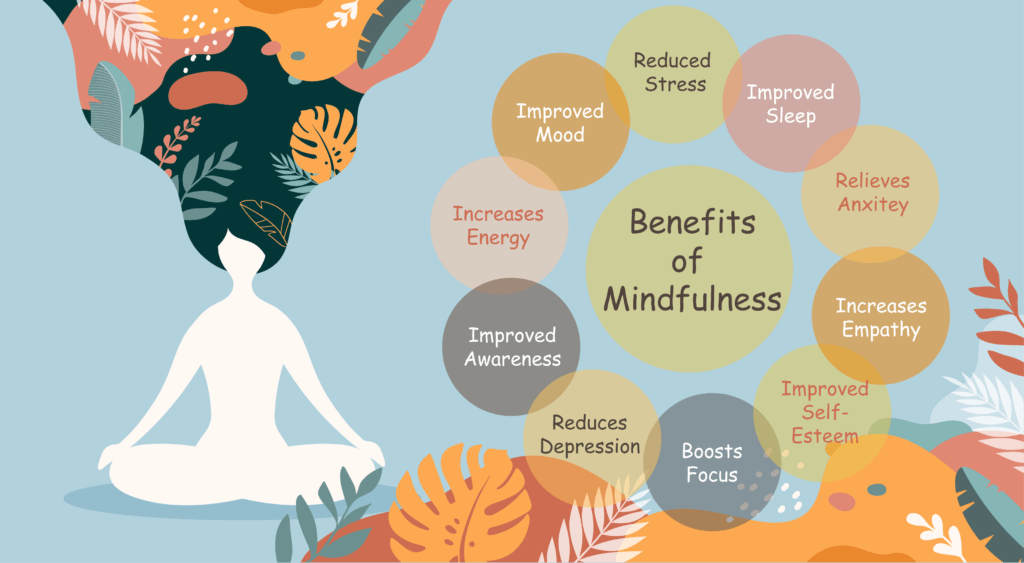Mindfulness, the practice of being present and fully engaged in the present moment, has gained popularity in recent years as a powerful tool for reducing stress, enhancing well-being, and promoting overall mental and emotional health. While mindfulness meditation is often associated with seated meditation practices, incorporating mindfulness into your daily life doesn’t have to be limited to formal meditation sessions. In this blog post, we’ll explore the benefits of mindfulness, practical ways to incorporate mindfulness into your daily routine, and tips for cultivating a more mindful approach to life.
Understanding the Benefits of Mindfulness
Mindfulness offers a wide range of benefits for both mental and physical well-being. Here are some of the key advantages of practicing mindfulness:
- Stress Reduction: Mindfulness can help reduce stress by promoting relaxation, emotional regulation, and resilience in the face of challenges.
- Improved Mental Health: Regular mindfulness practice is associated with reduced symptoms of anxiety, depression, and other mental health disorders.
- Enhanced Focus and Concentration: Mindfulness enhances focus, attention, and concentration by training the mind to stay present and attentive to the task at hand.
- Increased Self-awareness: Mindfulness fosters greater self-awareness by helping individuals tune into their thoughts, emotions, and bodily sensations without judgment.
- Better Relationships: Mindfulness improves communication, empathy, and compassion, leading to healthier and more fulfilling relationships with others.
Practical Ways to Incorporate Mindfulness into Daily Life
- Mindful Breathing: Take a few moments throughout the day to focus on your breath. Notice the sensation of the breath as it enters and leaves your body, anchoring your attention in the present moment.
- Mindful Eating: Practice mindful eating by savoring each bite of your meals. Notice the taste, texture, and aroma of the food, and pay attention to the sensations of hunger and fullness in your body.
- Mindful Movement: Engage in mindful movement practices such as yoga, tai chi, or walking meditation. Pay attention to the sensations of movement in your body and the rhythm of your breath as you move.
- Mindful Listening: Practice active listening during conversations with others. Give your full attention to the speaker without interrupting or planning your response, and notice the nuances of their words and body language.
- Mindful Work: Bring mindfulness into your workday by taking short mindfulness breaks between tasks. Pause to breathe deeply, stretch, or simply rest your attention on the present moment before moving on to the next task.
- Mindful Technology Use: Consciously limit your screen time and practice mindful technology use. Notice how you feel before, during, and after using electronic devices, and consider taking digital detoxes or unplugged breaks to recharge.
- Mindful Gratitude: Cultivate a daily gratitude practice by reflecting on three things you’re grateful for each day. Notice the positive aspects of your life and express appreciation for the people, experiences, and blessings you have.

Tips for Cultivating a Mindful Approach to Life
- Start Small: Begin with short, manageable mindfulness practices and gradually build up to longer sessions as you become more comfortable with the practice.
- Be Patient and Non-judgmental: Approach mindfulness with patience and curiosity, without expecting instant results or judging yourself for wandering thoughts. Remember that mindfulness is a skill that develops over time with practice.
- Integrate Mindfulness into Daily Routines: Look for opportunities to weave mindfulness into your existing daily routines, such as during your morning routine, commute, or evening wind-down.
- Practice Consistently: Set aside dedicated time each day for mindfulness practice, even if it’s just a few minutes. Consistency is key to reaping the full benefits of mindfulness.
- Stay Open-minded: Approach mindfulness with an open mind and a willingness to explore new ways of relating to yourself and the world around you. Be open to experimentation and adaptation as you discover what works best for you.
In conclusion, incorporating mindfulness into your daily life offers a myriad of benefits for your mental, emotional, and physical well-being. By practicing mindfulness in simple yet intentional ways throughout your day, you can cultivate greater presence, peace, and clarity of mind, enhancing your overall quality of life. Remember, mindfulness is not just a practice—it’s a way of being that can transform how you relate to yourself, others, and the world around you.
Also Read:
- Building a Sanctuary: Creating a Healthy Home Environment for Well-being
- Unlocking the Power of Quality Sleep: Strategies for Better Mental Health
- Seeking Professional Help for Mental Health: Therapy, Counseling, and Support Groups
- The Crucial Role of Self-Care and Self-Compassion in Nurturing Well-being
- Building Resilience and Emotional Well-being: Strategies for Thriving in Adversity
- Coping Strategies for Anxiety and Depression: Practical Techniques for Mental Well-being
- Mindfulness Meditation for Beginners: A Step-by-Step Guide to Inner Peace
Keywords: mindfulness in daily life, benefits of mindfulness, incorporating mindfulness, mindful living, mindfulness practices, cultivating mindfulness.

